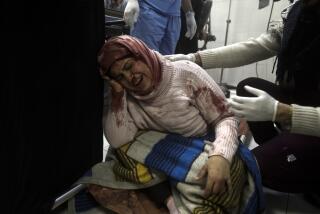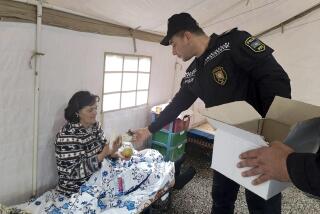Contras Meet Reagan, Urge ‘Escrow’ Aid Fund
- Share via
Top Nicaraguan rebel leaders told President Reagan on Thursday that the contras could fight until a scheduled Nov. 7 cease-fire without new U.S. military aid, but they asked him for more humanitarian aid in any event and a military “escrow account” to be tapped should the region’s shaky peace plans collapse.
The President supports the aid request’s “general approach,” White House spokesman Marlin Fitzwater said after Reagan met with the rebel leaders here.
However, Fitzwater said, the President will not decide what assistance he will ask Congress to provide the Nicaraguan rebels until Sept. 30, when a $100-million U.S. aid package legally expires.
Two-Part Package
Under the contra proposal, the aid would “contain a humanitarian part that will be disbursed immediately and continuously without interruption” after its allotment by Congress, rebel political leader Alfredo Cesar told a press conference after the meeting with Reagan.
Any military aid, Cesar said, would “remain in escrow--it will not be disbursed unless dictator (Daniel) Ortega’s government does not comply with the peace plan objectives by Nov. 7.”
Fitzwater said later, however, that the timing of any aid decision would have to be worked out with Congress.
Throngs Protest
Reagan met with the contras’ six-member political directorate and their military commander, Col. Enrique Bermudez, at the Century Plaza Hotel as throngs of pro- and anti-contra demonstrators chanted and waved placards across the street. (Story, Page 16.)
It was the only serious political demonstration so far on the President’s three-week summer vacation in California.
In a 40-minute session tailored to reassure the contras and U.S. conservatives, the President reportedly voiced suspicion that Nicaragua’s leftist government would not carry out the sweeping democratic reforms to which it agreed in regional peace talks early this month.
“He said, ‘We won’t let them get away with a fake democracy’ ” inside Nicaragua, a member of the contras’ directorate, Adolfo Calero, said after the session.
The contras have offered grudging support for the regional peace plan, agreed to Aug. 7 by Nicaragua and its four U.S.-backed neighbors--Guatemala, El Salvador, Honduras and Costa Rica. That plan calls for a cease-fire on Nov. 7 if Nicaragua begins to carry out sweeping democratic reforms by that date.
According to Fitzwater, Bermudez assured Reagan on Thursday that the rebels could survive in the field until Nov. 7, even though U.S. military aid expires at the end of next month.
“He didn’t really get specific. He just said they could do it,” Fitzwater said.
Another rebel political leader, Pedro Joaquin Chamorro, agreed, saying that “our people survived for almost two years without aid from the United States” when Congress cut off military assistance in 1983.
Struggle for Aid
But both the White House and the rebels have struggled to come up with the means to keep the contras intact during peace talks this fall, after the current aid package runs out.
While Reagan met with the contras, 1,500 to 2,000 pickets protested outside. The anti-contra protesters intermingled in often heated exchanges with 400 to 600 members of organizations supporting the President’s Central American policies.
More than 20 peace groups chanted “No Contra Aid!” as members of Young Americans for Freedom, the American Coalition for Traditional Values and other groups tried to outshout them with cries of “Yes Contra Aid!”
There were no arrests and no injuries, but about two dozen police in riot gear monitored the noisy event.
It was unclear whether the President could see the marchers, who held up such signs as, “I’m a Republican Against Contra Aid, Mr. President,” and “Just Say No to Drugs, Say No to Contras,” apparently a reference to allegations of contra involvement in drug smuggling.
In their proposal to Reagan, the rebel leaders asked for so-called “non-lethal” assistance such as food, clothing and medicine to keep their troops intact this fall as final peace terms are hammered out and implemented.
But they warned that the Sandinistas would renege on democratic reforms promised in the peace plan unless the United States also holds out the prospect of renewed military aid to the rebels.
Calero said that Congress should allot military aid to the rebel forces to be held in abeyance unless Reagan decides that Nicaragua is not complying with the terms of the Central American peace plan.
“Our people will continue to be in the field and will continue to fight in Nicaragua until a cease-fire is agreed on between us and the Sandinistas,” Chamorro said.
He added that the contra army would not disband on a mere promise of reform by Nicaragua’s government but would remain in the field “until we see that conditions in Nicaragua are on an irreversible track to democracy.”
Once that occurs, military aid should be used instead to aid the Nicaraguan people and help rebuild a credible political opposition inside the country, he and the other contra leaders said.
Refuse to Give Figure
They refused to say how much military and humanitarian aid they thought should be set aside, saying that is Congress’ task.
Reagan has agreed to delay any new aid request until at least Sept. 30 under a White House peace proposal offered jointly with House Speaker Jim Wright (D-Tex.). The contra leaders were to fly to Dallas today to plead their cause with Wright.
Fitzwater said later that the contras’ aid request poses “technical” questions for the White House to study before it can offer unqualified support.
Nevertheless, the package appeared to be close to the White House view of what a Democratic Congress, reluctant to throw any wrenches in the Central American peace talks, is likely to approve.
The other members of the contras’ directorate, besides Cesar, Calero and Chamorro, are Alfonso Robelo, Aristides Sanchez and Azucena Ferrey.
Before the rebel officials met with Reagan, one of their former colleagues called a news conference at the hotel to denouce U.S. aid to the contras as a waste of money and bullets.
Edgar Chamorro, who left the contras’ political directorate in 1984, called the contras “ineffective, politically and militarily” in their seven-year war against the Sandinistas.
More to Read
Sign up for Essential California
The most important California stories and recommendations in your inbox every morning.
You may occasionally receive promotional content from the Los Angeles Times.













